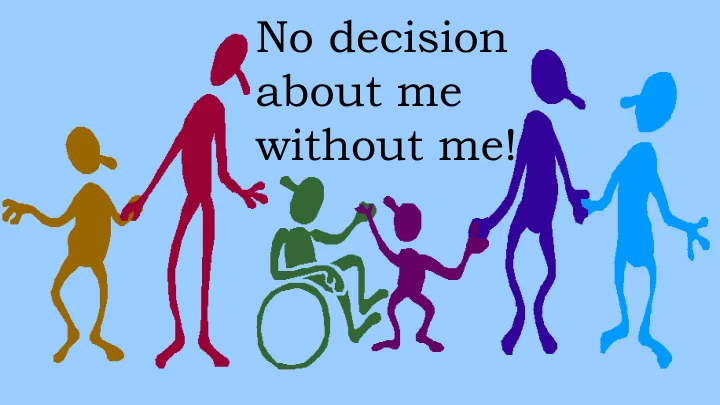

No decision about me without me!
‘The core purpose of adult care and support is to help people to achieve the outcomes that matter to them in their life.’ (Care Act 2014) Chapter 1, Care and Support Act Statutory Guidance (DH, 2017).
‘In future, professional guidance should be best formulated as principles that professionals apply intelligently in particular cases’ ‘Dealing with the variety of need is better achieved by professionals understanding the underlying principles of good practice and developing expertise to apply them’. The Munro Review of Child Protection., May
Ideas about risk are personal and are built up over a lifetime” “Understanding that people have differing ideas about risk is an important step in reaching a shared approach to risk assessment and management…” “A willingness to take risks can be a crucial part of a person’s self - identity”. Nothing Ventured, Nothing Gained: Risk Guidance for People with Dementia - DH Nov 2010.
“ ’Making risks clear and understood is crucial to empowering service users and carers, recognising people as ‘experts in their own lives’ ” “Risk is no longer an excuse to limit people's freedom”. A Vision for Adult Social Care, DH November 2010.
‘Police have effective ways of assessing and managing risk using the National Police Decision making model and other accredited risk tools and take appropriate action. As the lead investigating agency, the police should work with the local authority and other partner agencies to ensure that all relevant information is shared and identified and a risk management or safeguarding plan is agreed at an early stage. In cases where criminal proceedings are deemed inappropriate, the police should agree a course of action with partnership agencies to protect the adult (s).’ Skills for Care.
‘ Risk taking offers the possibility of harm but also the chance of success. As a natural part of life risk should not be feared, yet the term has assumed negative connotations, i.e., that something is a risk only when the chance of harm and criticism is high. As a result, making risk decisions has become associated with blame, fear, internal and external inquiries and, therefore, something to be avoided. Despite the inherent uncertainty, however, operational decision making provides the opportunity for success as well as the possibility of harm.’ Risk Principles College of Policing.
‘Staff cannot be ordered to work in a strengths-based way, the motivation is value-driven and must come from within but that strong leadership is essential in modelling different behaviours and leading organisational change.’ Strengths-based social work practice with adults 2017.
Research by the Joseph Rowntree Foundation (JRF), Whose risk is it anyway?, highlighted that supported people often consider risk assessments as being a barrier to choice: ‘Risk is important – but people using services often perceive this in a disempowering way as something that is imposed on them by the system’.
‘ In order to change the culture, organisations also need to change the language and terminology used around risk: ‘bureaucratic language often leads to bureaucratic solutions’. Risk and Self Directed Support 2014.
‘ Partner organisations should ensure that they have the mechanisms in place to enable early identification and assessment of risk through timely information sharing and targeted multi-agency support. Multi-Agency Safeguarding Hubs may be one model to support this approach but they are not the only one. Individual organisations’ policies and strategies for adult safeguarding should include measures to minimise the circumstances of risk including isolation, which can make adults vulnerable to harm.’ MARM Hampshire Portsmouth Southampton and Isle of Wight SAB’s.
‘Risk management is also one of the pillars of corporate governance. To be effective, it must be clearly aligned to the organisation’s strategic objectives, ensuring that there is a strong focus at the top of the organisation………. It must, therefore, be embedded into the culture of the organisation as a shared responsibility and be central to the Commissioners work.’ C ambridge Police and Crime Commissioner 2013.
‘ Safeguarding means protecting an adult’s right to live in safety, free from abuse and neglect. It is about people and organisations working together to prevent and stop both the risks and experience of abuse or neglect, while at the same time making sure that the adult’s wellbeing is promoted including, where appropriate, having regard to their views, wishes, feelings and beliefs in deciding on any action.’ The Care Act Statutory Guidance, 2014 Chapter 14.
‘ Risk is often thought of in terms of danger, loss, threat, damage or injury, although in addition to potentially negative characteristics, risk taking can have positive benefits for individuals and their communities. As well as considering the dangers associated with risk, the potential benefits of risk-taking should therefore also be identified; a process which should involve the individual using services, their families and health or social care practitioners’ A Positive Approach to Risk and Personalisation.
‘For many who are expected to comply with the Act it appears to be an optional add-on, far from being central to their working lives…the prevailing cultures of paternalism (in health) and risk-aversion (in social care) have prevented the Act from becoming widely known or embedded….The duties imposed by the Act are not widely followed.’ The Learning Disabilities Mortality Review.
‘ Research shows that a risk-averse attitude among practitioners can lead to generalisations about certain service user groups. The responsibility for encouraging risk-taking can make practitioner feel trapped in the invidious position of trying to balance personalisation with their duty to keep people safe.
‘What is the point of me being safe if it makes me miserable?’
Recommend
More recommend